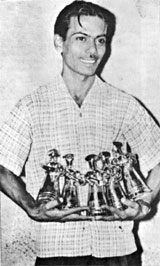Zahir Raihan
| Zahir Raihan | |
|---|---|
 |
|
| Native name | জহির রায়হান |
| Born | Mohammad Zahirullah 19 August 1935 Feni, Noakhali, British India (present-day Bangladesh) |
| Occupation | Filmmaker, novelist, writer |
| Nationality | Bangladeshi |
| Education | BA (Bengali) |
| Alma mater | Dhaka University |
| Notable awards | Bangla Academy Award (1972) |
| Spouse |
Sumita Devi (1961–1968) Shuchonda (1968–1971) |
| Relatives | Shahidullah Kaiser (brother) |
| Disappeared | January 30, 1972 (aged 36) |
| Status | Presumed dead |
Zahir Raihan (19 August 1935 – 30 January 1972) was a Bangladeshi novelist, writer and filmmaker. He is perhaps best known for his documentary Stop Genocide, made during the Bangladesh Liberation War.
Zahir Raihan was born on 19 August 1935, as Mohammad Zahirullah, in the village Majupur, now in Feni District, Bangladesh. After the Partition of Bengal in 1947, he, along with his parents, returned to his village from Calcutta. He obtained a Bachelor of Arts (Honours) in Bengali from Dhaka University.
Zahir Raihan received his post graduate degree in Bengali Literature. Along with literary works, Raihan started working as a journalist when he joined Juger Alo in 1950. Later he also worked in newspapers, namely Khapchhara, Jantrik, and Cinema. He also worked as the editor of Probaho in 1956. His first collection of short stories, titled Suryagrahan, was published in 1955. He worked as an assistant on the film Jago Huya Sabera in 1957. This was his first direct involvement in film. He also assisted Salahuddin in the film Je Nodi Morupothay. The filmmaker Ehtesham also employed him on his movie A Desh Tomar Amar, for which he wrote the title song. In 1960 he made his directorial début with his film Kokhono Asheni, which was released in 1961. In 1964, he made Pakistan's first colour movie, Sangam, and completed his first CinemaScope movie, Bahana, the following year.
He was an active supporter of the Language Movement of 1952 and was present at the historical meeting of Amtala on 21 February 1952. The effect of the Language Movement was so strong on him that he used it as the premise of his landmark film "Jibon Theke Neya". He also took part in the "Gano Obhyuthyan" in 1969. In 1971 he joined in the Liberation War of Bangladesh and created documentary films on the subject. During the war of liberation Raihan went to Calcutta, where his film "Jibon Theke Neya" was shown. His film was highly acclaimed by Satyajit Ray, Mrinal Sen, Tapan Sinha and Ritwik Ghatak. Though he was in financial difficulties at the time, he gave all his money from the Calcutta showing to the Freedom Fighters trust.
...
Wikipedia
